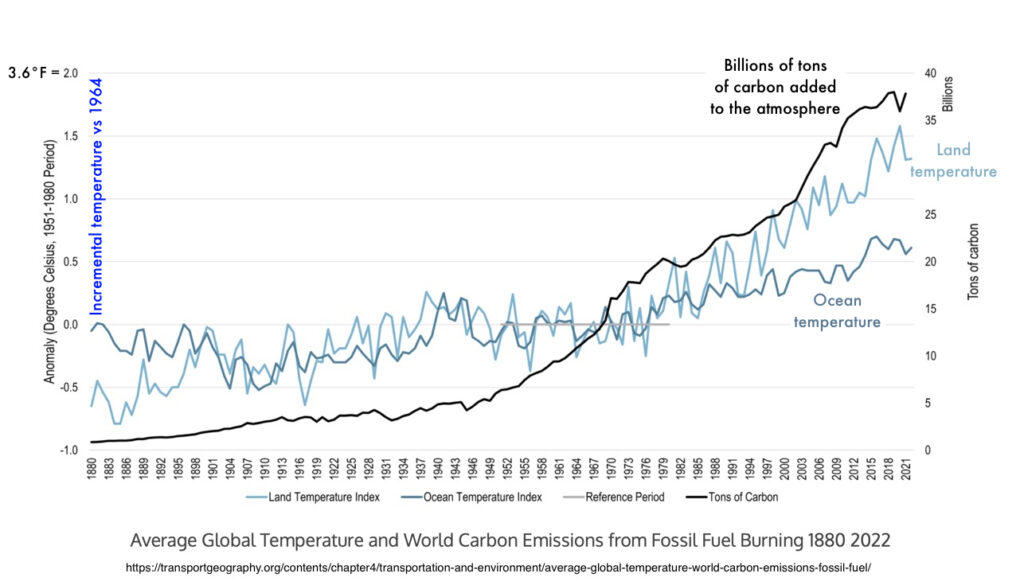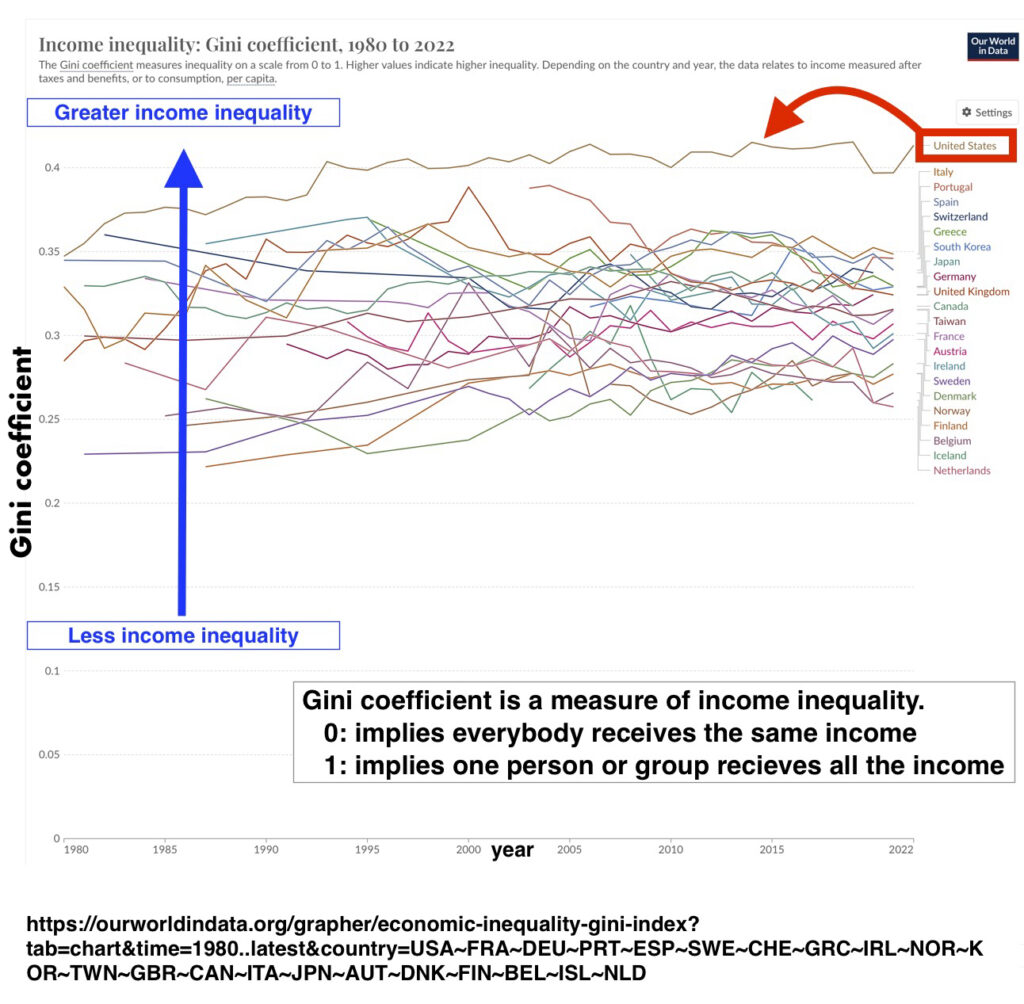To many Americans, “unbridled capitalism” is synonymous with progress, innovation, and American prosperity.
They believe that any restrictions on the free market will stifle creativity and harm society, viewing the market as a sacrosanct, self-correcting, benevolent force that drives America’s global leadership.
But capitalism without guardrails allows markets to set prices without accounting for broader societal harms—environmental damage, public health crises, financial instability, and widespread social disruption. It concentrates extraordinary wealth in the hands of a few, giving them disproportionate power to shape society for their benefit, it undermines the democratic ideal of “one person, one vote,” and fuels societal discord.
This essay explores how unbridled capitalism has impacted:
- Our Environment
- Our Healthcare System
- Our Banking and Investment Industry
- Our Vices: Cigarettes, Narcotics, and Junk Food
- The Education of Our Children
- Our Billionaires, Political Inequity, and Fiscal Inequity
- The Impending Artificial Intelligence Tsunami and Our Future
Together, these examples make the case for a national conversation about the true cost of unbridled capitalism—and the need for thoughtful reform to protect our democracy, society, and future.
Unbridled capitalism has empowered the fossil fuel industry to wreak havoc on the planet’s fragile ecosystems. By emitting billions of tons of carbon into the atmosphere, these companies have driven global temperatures up by approximately 3°F. This temperature rise poses an existential threat to low-lying communities, human civilization, and countless ecosystems around the globe.
The effects of this warming extend far beyond rising sea levels. Air pollution from fossil fuels is responsible for 8 million deaths annually, and the resulting extreme weather events cause $150 billion in climate-related damage each year in the United States alone, while communities are left to shoulder these enormous costs.
Despite generating $4 trillion in annual profits, the fossil fuel industry has shifted these and other costs onto the society, while spending billions denigrating climate scientists, impeding the installation of clean energy alternatives, and spreading misinformation about climate science. These actions have accelerated environmental degradation and placed the future of humanity and the planet at grave risk.
Unbridled capitalism is metaphorically forcing us to defecate in our own beds.
Decades of unbridled capitalism in the U.S. healthcare industry have led to the highest per capita healthcare costs and the shortest average life expectancy among industrialized nations.
In 2007, healthcare expenses accounted for 62% of all personal U.S. bankruptcies, a staggering increase from just 8% in 1981.
Equally alarming, private equity firms are quietly acquiring profitable medical practices and hospitals, deprioritizing their healthcare mission and prioritizing profits over all else. A study of 662,095 hospitalizations at 51 private equity-acquired hospitals found that the “(p)rivate equity acquisition of hospitals … was associated with increased hospital-acquired adverse events … suggesting poorer quality of inpatient care.”
Decades of unbridled healthcare capitalism has not only failed to address these systemic issues—rising costs, declining outcomes—but has actively exacerbated these deficiencies.
Our Banking and Investment Industry
The 2008 financial crisis is a striking example of how unbridled capitalism can destabilize the economy, leaving millions of Americans homeless, jobless, and without savings. This catastrophe was fueled by decades of deregulation in the financial sector, which allowed banks and other institutions to prioritize short-term profits over long-term stability.
In his post-mortem testimony to Congress, Alan Greenspan—former Federal Reserve Chair and a staunch proponent of free-market policies—admitted that his faith in self-regulation had been misplaced. He stated:“I made a mistake in presuming that the self-interest of organizations, specifically banks and others, were such is (sic) that they were best capable of protecting their own shareholders and their equity in the firms” … [and did not require Federal regulation].
Greenspan’s admission underscored the dangers of unregulated markets, a sentiment echoed in the U.S. Federal Government’s Financial Crisis Inquiry Report of January 2011. The report concluded: “More than 30 years of deregulation and reliance on self-regulation by financial institutions…had stripped away key safeguards, which could have helped avoid catastrophe.”
This failure of self-regulation and reliance on free-market ideology highlights the broader dangers of unbridled capitalism: when corporations and financial institutions are left unchecked, their pursuit of profit can wreak havoc on the lives of ordinary people and the economy as a whole.
Our Vices: Cigarettes, Narcotics, and Junk Food
The tobacco industry, Purdue Pharma (maker of OxyContin), and the junk food industry have long known that their products kill or harm millions of Americans. Yet, driven by unbridled capitalism’s prioritization of short-term profits above all else, these companies actively worked to suppress or discredit evidence of the harm they caused.
The tobacco industry spent decades hiding research linking smoking to cancer and heart disease. Purdue Pharma misled doctors and the public about the addictiveness of OxyContin, fueling the devastating opioid crisis. Junk food companies, meanwhile, have aggressively marketed addictive (and here) fatty, sugary, processed foods (e.g. Lay’s Potato Chips’s ad campaign “Bet you can’t eat just one“)—often targeting children—despite overwhelming evidence of links to obesity, diabetes, and heart disease.
These industries thrived in a system of unbridled capitalism, where profits were prioritized over public health and regulatory oversight was weak or undermined. As a result, millions of Americans have needlessly lost their lives, and countless others have suffered long-term health consequences.
In 2022, Arizona implemented a universal “education savings account” program, providing $7,000 annually to every K-12 student.
While marketed as a way to expand school choice, the program has disproportionately benefited the wealthy and exceeded its budget projections, accounting for 50% of the Arizona’s budget deficit. These state funds are directed to private schools, which are exempt from the educational and anti-discrimination standards that apply to public schools and are not even required to be licensed. In response to this influx of state funding, many private schools have raised tuition, making them unaffordable to lower-income families.
At the same time, public schools are being drained of wealthier students, which has diminished political support for public education. This has resulted in the closure of public schools and the creation of a two-tier primary and secondary educational system. This trend undermines the long-held American ideal that all children should receive a universal, knowledge-based, secular, public education. In Arizona, that ideal has disappeared—and other states will follow suit.
America’s billionaires now see the privatization of the educational system as a windfall opportunity, not unlike private equity entities buying hospitals. There is little to no downside risk—they will create a so-called “efficient” educational system that prioritizes profit over education. In the end, America’s business sector will face a poorly educated workforce, and its political system will suffer from the erosion of a universally educated electorate. The price of removing generations of students from public schools will be staggering.
Our Billionaires, Political Inequity, and Fiscal Inequity
Unbridled capitalism has concentrated immense wealth in the hands of 25 Americans, each with a net worth exceeding $34 billion. With an 8% annual return on their investments, each billionaire could spend $2 billion a year—enough to singlehandedly fund an entire presidential, senatorial, congressional, and judicial campaign—and yet their wealth would continue to grow. To put this in perspective, total campaign expenditures for the 2024 election cycle are estimated at $16-21 billion.
This immense concentration of wealth allows a small, elite group to wield disproportionate power over political campaigns and public policy, fundamentally distorting America’s democracy. When a handful of individuals can finance entire elections, the principle of “one person, one vote” becomes a hollow illusion, fueling public cynicism and eroding trust in the democratic process.
The United States now has one of the highest levels of income inequality among industrialized nations. This extreme economic disparity engenders resentment, which fosters political polarization, distrust of institutions, and hinders meaningful political dialog.
While there are viable solutions to reduce inequality without stifling innovation (e.g. realign incentives and ban billionaires), addressing these issues is beyond the scope of this essay. What remains clear, however, is that unbridled capitalism has concentrated wealth and power to such an extent that it now threatens the very foundation of American democracy.
The Impending Artificial Intelligence Tsunami and Our Future
The October 2007 IMF World Economic Outlook report concluded “that the main factor driving the recent increase in inequality across countries has been technological progress.”
The artificial intelligence and social media harvesting giants of today—Meta, X/Twitter, Google, Microsoft, and OpenAI—are thus responsible for having accelerated America’s inequity trend, primarily because America’s unbridled capitalism has allowed them to amass vast troves of our personal data which they convert into revenue.
Social media has already inflicted significant harm on American democracy and mental health, fueling political polarization, spreading misinformation, and undermining trust in institutions.
In Genesis, Henry Kissinger, Eric Schmidt, and Craig Mundie speculate that AI’s impact will be much more extreme than we imagine. It could transform the world into a Star Trek-like utopia of abundance and leisure. Alternatively, it could lead to a dystopia where humans worship AI as omniscient deities—or are dethroned from their place at the top of Earth’s hierarchy. While these scenarios remain speculative, they underscore the profound and unpredictable societal changes that unregulated AI could bring—changes currently being shaped by profit-driven corporations rather than democratic oversight.
The unelected “techno-oligarchs” are steering us toward a future shaped entirely by their own priorities. With no societal guardrails, our only option is to wait and see where they take us–for better or worse. This is unbridled capitalism at its worst!
In 2017, Sam Altman, the founder of ChatGPT, warned: “Technology leads to increasing wealth inequality… If we don’t take a radical step toward a fair, inclusive system, we will not be the leading country in the world for much longer.”
Unbridled capitalism has created this mess. We should take Sam’s words to heart.
I am a capitalist. I believe capitalism has objectively and markedly improved the welfare of most of the world’s citizens.
Nevertheless, unbridled capitalism has objective disadvantages.
Even Alan Greenspan, former Federal Reserve Chairman and a staunch advocate of free markets, has acknowledged the need for regulation to protect society, as had Sam Altman of ChatGPT. Their insights reflect a broader truth: unbridled capitalism can have devastating societal wide consequences.
History offers examples of thoughtful regulation that harnessed capitalism’s benefits while mitigating its harms. The New Deal of the 1930s introduced transformative reforms—such as Social Security, labor protections, and financial regulations—that stabilized the economy and reduced inequality. More recently, regulations imposed on banks after the 2008 financial crisis have reduced the risk of market collapses without stifling innovation or the growth of the stock market.
Left unchecked, unbridled capitalism has and will bring death to Americans, further exacerbate fiscal inequity, lead to the concentration of immense financial and political power in the hands of several dozen Americans, and then destroy America’s democracy.
It is time for America to rethink its reverence for unbridled capitalism. Thoughtful reforms can preserve capitalism’s strengths while protecting society from its excesses. Our democracy and future depend on it.
Hayward Zwerling
5 January 2025







